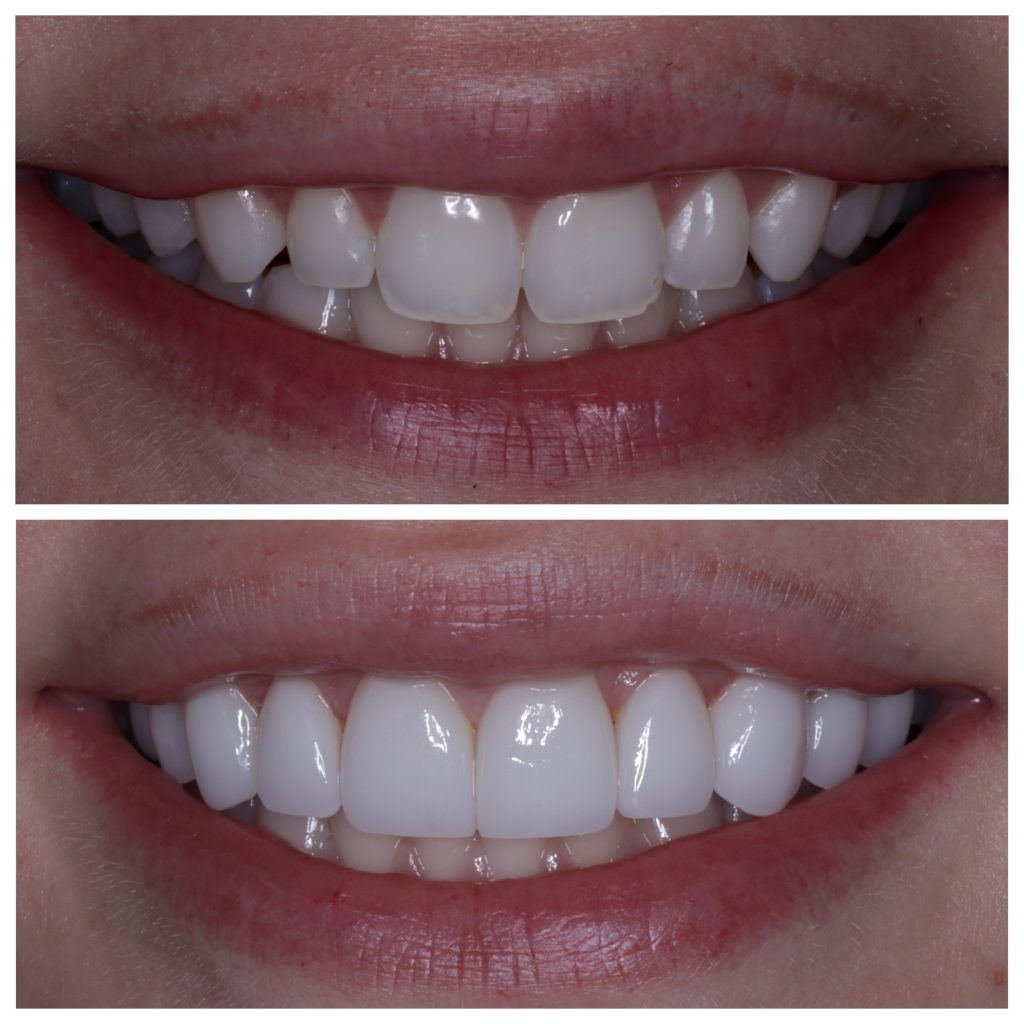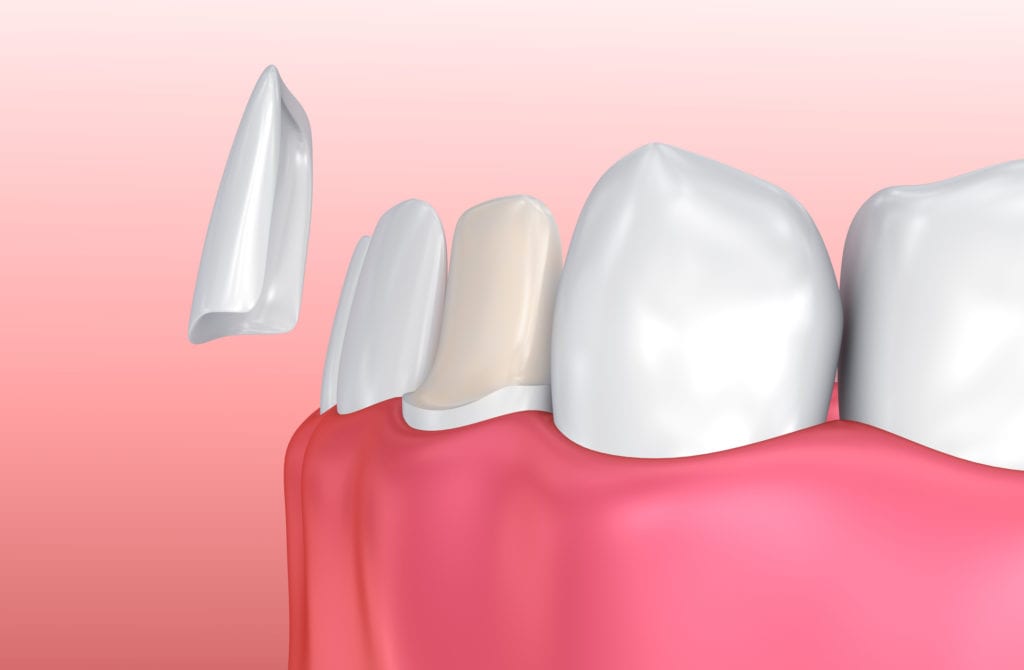The Full Summary of Veneers: Kinds, Utilizes, and Their Influence on Your Smile
Veneers serve as a prominent service for people looking for to improve their dental appearances. These custom-crafted shells can properly mask imperfections such as discoloration and voids. With two main types readily available, porcelain and composite resin, each offers distinctive benefits and limitations. The impact of veneers prolongs past plain appearance, affecting self-esteem and social communications. Recognizing their types and benefits is vital. What might this suggest for one's overall high quality of life?
Recognizing Veneers: What They Are and Exactly how They Function
Veneers are thin shells, normally made from porcelain or composite material, that are custom-crafted to fit over the front surface area of teeth. They offer both aesthetic and functional purposes, supplying a remedy for various dental imperfections such as discoloration, voids, and small imbalances. By adhering to the tooth enamel, veneers develop an all-natural look while improving the form and color of the teeth.
The process usually includes an initial examination, where a dentist evaluates the patient's needs and reviews wanted end results - Dental Veneers. Following this, a very little quantity of enamel may be eliminated to suit the veneer. Impressions of the teeth are then required to assure an exact fit. When produced, the veneers are bonded securely to the teeth making use of an unique dental adhesive. This treatment not just enhances the smile's appearance but also aids shield the underlying teeth from additional damages, making veneers a popular choice for numerous seeking a smile remodeling
Sorts of Veneers: Porcelain vs. Composite Material
The distinction between porcelain and composite material veneers depends on their product composition and features. Each kind provides differing degrees of expense, durability, and long life, influencing patients' choices based on their specific requirements. Recognizing these differences is crucial for making a notified decision pertaining to oral enhancements.
Product Distinctions Discussed
While both porcelain and composite material veneers serve the very same cosmetic purpose, they vary considerably in material properties, toughness, and visual outcomes. Porcelain veneers are crafted from a ceramic material that simulates the all-natural translucence of teeth, offering a natural look. Their smooth surface is resistant to staining, making them an appealing choice for those looking for a durable aesthetic. On the other hand, composite resin veneers are made from a tooth-colored plastic product, supplying versatility and simplicity of application. Nonetheless, they might not accomplish the very same level of brightness or clarity as porcelain. Additionally, composite veneers can be much more quickly formed and fixed, making them a more flexible choice in specific oral circumstances. Each kind provides special advantages customized to specific choices.
Durability and Longevity
Long life and durability are substantial factors when comparing porcelain and composite resin veneers. Porcelain veneers are recognized for their strength, usually long lasting 10 to 15 years with appropriate treatment. Their resilience against cracking and discoloring makes them a preferred choice for people looking for long-lasting results. In contrast, composite resin veneers commonly have a much shorter life expectancy, averaging 5 to 7 years. While they can be fixed a lot more easily if harmed, they are extra prone to use and discoloration over time. The selection in between these materials often relies on the person's way of life, aesthetic objectives, and upkeep choices. Eventually, understanding the distinctions in long life and durability can guide clients in choosing the veneer kind that finest fits their requirements.
Expense Comparison Insights
Cost is an essential factor to consider when picking between porcelain and composite material veneers. Porcelain veneers commonly range from $800 to $2,500 per tooth, showing their resilience, visual appeal, and resistance to staining. These veneers call for a more extensive treatment and specialized laboratory work, adding to their greater price. In contrast, composite resin veneers are normally more affordable, setting you back in between $250 and $1,500 per tooth. They can be applied in a solitary visit, which minimizes labor costs. Composite veneers may require more frequent replacements, potentially boosting lasting expenses. Eventually, the selection between porcelain and composite material veneers relies on specific spending plans and desired end results, balancing first prices versus long life and visual results.
The Advantages of Choosing Veneers for Your Smile
Choosing veneers offers significant benefits for those seeking an improved smile. Their enhanced visual charm can change the appearance of teeth, while their stain-resistant residential or commercial properties guarantee a long lasting brightness - What Are Veneers. This mix makes veneers a preferred alternative for individuals looking to achieve a flawless smile
Enhanced Aesthetic Appeal
When individuals seek to enhance their smiles, veneers usually become a popular remedy because of their transformative aesthetic benefits. These slim shells, usually made from porcelain or composite resin, can successfully conceal flaws such as chips, gaps, and imbalance. By simulating the natural appearance of teeth, veneers offer a smooth, radiant smile. Their customizable nature permits a tailored approach, making it possible for individuals to choose tones and forms that ideal suit their facial functions. Additionally, veneers can produce an uniform look, enhancing total face symmetry. This aesthetic improvement not This Site just increases self-confidence however can also favorably affect social interactions and individual connections, making veneers a prominent option for those looking to accomplish a brighter, more appealing smile.
Tarnish Resistance Advantages
Veneers not just enhance aesthetic charm but additionally provide substantial tarnish resistance, making them an appealing choice for people worried regarding keeping a bright smile. Composed of sturdy materials such as porcelain or composite resin, veneers are less permeable than all-natural teeth, which helps prevent the absorption of discolorations from common culprits like coffee, tea, and red a glass of wine. This intrinsic tarnish resistance permits individuals to enjoy their favored drinks without fretting about staining. What Are Veneers. Furthermore, the smooth surface area of veneers makes them link much easier to tidy, more boosting their durability and maintaining their pristine appearance. Consequently, veneers give a practical remedy for those looking for both charm and performance in their oral care
The Process of Getting Veneers: What to Expect

Although the procedure of getting veneers might appear daunting, recognizing the actions involved can reduce issues. Originally, an assessment with a dentist is needed to figure out if veneers are the suitable service for the person's dental issues. During this consultation, the dental practitioner will certainly talk about preferred end results and take impacts of the teeth.
Next off, a 2nd appointment is scheduled for tooth prep work, where a tiny amount of enamel is commonly removed to suit the veneers. Short-term veneers might be placed while the personalized ones are crafted in a dental laboratory, which generally takes a number of weeks.
Once prepared, the dental professional will place the veneers, making sure proper fit and shade before bonding them to the teeth using a special adhesive. After final adjustments, the dentist will give support on care. Understanding these steps can aid patients really feel a lot more comfortable and informed throughout the veneer procedure.
Maintenance and Treatment for Your Veneers
Keeping veneers requires constant like assure look at this web-site their longevity and appearance. Correct oral health is essential; brushing twice daily with a non-abrasive tooth paste and flossing frequently aid prevent plaque build-up around the veneers. In addition, routine dental exams are important for monitoring the problem of the veneers and addressing any type of prospective concerns beforehand.
When attacking to prevent damage, clients ought to prevent difficult foods and extreme force. It's also recommended to limit usage of discoloring materials, such as coffee, tea, and merlot, as these can affect the veneers' color over time.

Changing Your Smile: Real-Life Effect of Veneers
A glowing smile can substantially enhance one's confidence and overall look. For several individuals, veneers act as a transformative remedy, properly addressing different oral concerns such as staining, voids, and misalignment. These slim coverings, personalized to fit over the front of the teeth, can produce an unified and aesthetically pleasing smile.
Real-life situations illustrate the extensive impact veneers can have. Patients commonly report a prompt increase in self-confidence and social interactions following their procedure. The newfound self-confidence can cause even more chances in personal and expert life, as individuals really feel more inclined to involve and reveal themselves.
Furthermore, the psychological advantages extend past simple look; lots of experience boosted psychological well-being as they welcome their smiles. Veneers not only boost physical characteristics but additionally contribute substantially to general quality of life, emphasizing their worth in cosmetic dentistry.
Regularly Asked Concerns
The Length Of Time Do Veneers Commonly Last Before Needing Substitute?
Veneers generally last in between 10 to 15 years prior to requiring substitute. Elements such as dental health, dental habits, and the sort of material used can affect their longevity and overall resilience. Normal dental exams are recommended.
Can Veneers Be Removed, and if So, Exactly how?
Yes, veneers can be gotten rid of. A dental practitioner usually uses customized devices to carefully remove them from the teeth, making sure very little damage to the underlying enamel, commonly adhered to by essential adjustments or repairs for ideal looks.
Are Veneers Suitable for Every person's Dental Condition?

Will Obtaining Veneers Hurt or Require Anesthesia?
Getting veneers typically entails minimal pain, and lots of individuals receive neighborhood anesthesia to assure a pain-free experience. Sensitivity may occur temporarily afterward, however most discover the process tolerable and are pleased with the results.
Exactly How Do Veneers Affect Tooth Level Of Sensitivity After Placement?
Veneers can briefly boost tooth level of sensitivity as a result of the removal of enamel and the bonding procedure. Most people experience a decrease in level of sensitivity with time as the teeth get used to the brand-new veneers.
Veneers are slim coverings, usually made from porcelain or composite resin, that are custom-crafted to fit over the front surface of teeth. Porcelain veneers are crafted from a ceramic material that simulates the natural transparency of teeth, offering a lifelike look. Porcelain veneers generally vary from $800 to $2,500 per tooth, reflecting their longevity, visual charm, and resistance to discoloration. In contrast, composite resin veneers are usually more budget friendly, costing in between $250 and $1,500 per tooth. Composed of sturdy materials such as porcelain or composite resin, veneers are much less porous than natural teeth, which helps prevent the absorption of spots from typical culprits like coffee, tea, and red a glass of wine.